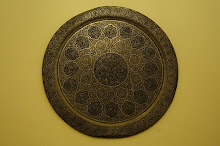Once, while having coffee at the Shepherd´s Hotel in Cairo, I was told that Egypt had never had more than 2-3 million people until the early 20th century when the population exploded reaching the 80-90 million people of today. Disease and child mortality had kept Um Eddunya (¨The Mother of the World¨) to an organic size until modern sanitation and medicine arrived from the West, bringing with them longer and healthier lives and a massive population explosion.
Cairo, and other places in Egypt, are a testament today to this overpopulation. High density streets, noise pollution, miasmic air, more suggestive of a gas chamber than an atmosphere, and a murky Nile all speak to this reality. And yet, a walk through Cairo remains a window onto the unique beauty of the Egyptian people, despite their vast and considerable tribulations.
A cripple with crutches clambers on to a Vespa and putters off into the crowded streets. A stranger helps two ladies, old and young, cross the maniacal traffic (the way they relate suggests long term intimacy rather than the distance common to strangers in the West's public space). Taxi drivers outside the Semiramis Intercontinental Hotel dance to Arabic tunes beside their empty cars even though tourism and their revenues are very much down.
The Egyptian people demonstate warmth, humour and resilience where many others would be be wallowing in a somber depression. There is also a sense that all individual Egyptians belong to one human organism stretching from Alexandria to Aswan. From Nasser´s state socialism, to Sadat´s private sector experiments, to Mubarak´s oligarchy, to today´s amateurish rise of the Muslim Brothers, Egyptians have not been well served by their governments. Differences of economic class and political views now abound, especially after the Pandora´s box was opened through the revolution. But the hand - and what is in it - remains outstretched from Egyptian to Egyptian, helping all manage from day to day.
Of course, this is also partly the problem. The country needs a long term economic plan and new social mechanisms to compete and thrive in the 21st century, not just this organic form of care. Poverty, ignorance, and many archaic and oppressive norms continue to plague the country and thwart new development.
Despite this harsh reality, there remain lessons to be learned for the rest of us. Unlike in the West, and even in some Middle Eastern countries, many basic emotional needs are met in Egypt day-to-day. The once-powerful civilization has also left its distant imprint in the sense of belonging to greater context, and to each other. These are two golden strands of human potential amidst Cairo´s brown and dusty chaos. Somehow it still seems more fundamentally human than the cold towers and technological efficiencies of more modern realms.














No comments:
Post a Comment